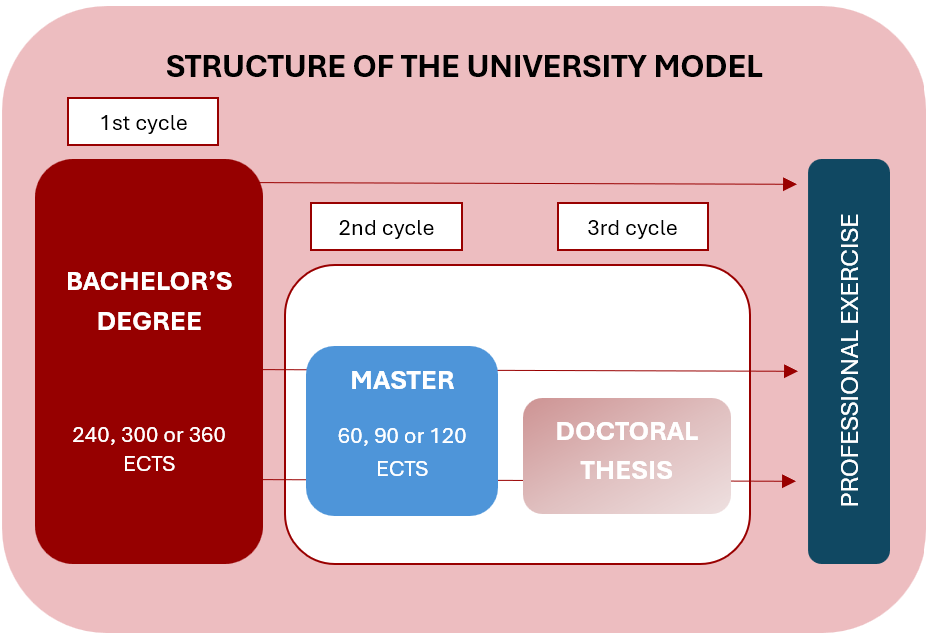Our pedagogical model
The basis of the educational teaching project of the URL is focused on the accompaniment of holistic teaching aligned with the Standards and Guidelines for Quality Assurance in the European Higher Education Area (ESG, 2015)
The pedagogical model of the Ramon Llull University is based on four axes:
- Integration of training and professional orientation with the global formation of the person.
- Combination of three levels of teaching action: class groups, medium collaborative work groups, seminar groups and practicum.
- Personalization of theoretical and practical learning.
- Commitment to the environment, which understands training as a lifelong process.
More information in the section Teaching innovation.
Structure of the university model
- Official university degrees, within the framework of the European Higher Education Area (EHEA), are structured in three cycles, each leading to the award of the corresponding degree.
- The first cycle leads to bachelor's degrees. These are official degrees that offer academic training oriented towards the acquisition of knowledge and competences that enable students to carry out professional activities.
- The second cycle leads to master's degrees. These are official degrees that offer advanced training, of a specialised or multidisciplinary nature, oriented towards academic or professional specialisation, or promote the initiation of research tasks.
- Doctorates are official third cycle degrees that offer advanced training in research techniques.
The university system adapted to the EHEA has ECTS credits (European Credit Transfer System) and competence training as its main axes. The ECTS is the measure of credit for the new degrees implemented within the framework of the EHEA. It aims to be able to track the actual work done by the student in the course of a subject, not only the teaching hours, as was the case up to now. It is also aimed at the easy recognition of the studies taken by students in any of the European countries that adopt it.
By competence we mean the knowledge, skills and attitudes that a person acquires during the course of their studies. Competence-based training or learning is based on an integral and holistic view of people's learning and, for this reason, the design of degrees based on this model allows students to be assessed not only on the acquisition of knowledge but also on the personal skills and attitudes they develop in relation to the professional profile of the degree.
- URL's own degrees are structured according to the course load leading to the corresponding degree:
- The Bachelor's Degree of 180 or 240 ECTS
- The Master of Lifelong Learning of 60, 90 or 120 ECTS
- The Diploma of University Specialization of 30 to 59 ECTS
- The University Expert from 15 to 29 ECTS
The broadening and updating of knowledge, competences and training or professional skills that contribute to an improvement in employment take the form of micro-credentials (training activities of less than 15 ECTS).

LIFELONG LEARNING
- Bachelor's degree: 180 or 240 ECTS
- Master of Lifelong Learning: 60, 90 or 120 ECTS
- Diploma of University Specialization: from 30 to 59 ECTS
- University Expert: from 15 to 29 ECTS
- Micro-credentials: less than 15 ECTS

MORE INFORMATION
Academic Organization and Quality Office
Ramon Llull University
c. Claravall, 1-3. 08022 Barcelona
Tel. (34) 936 022 209

